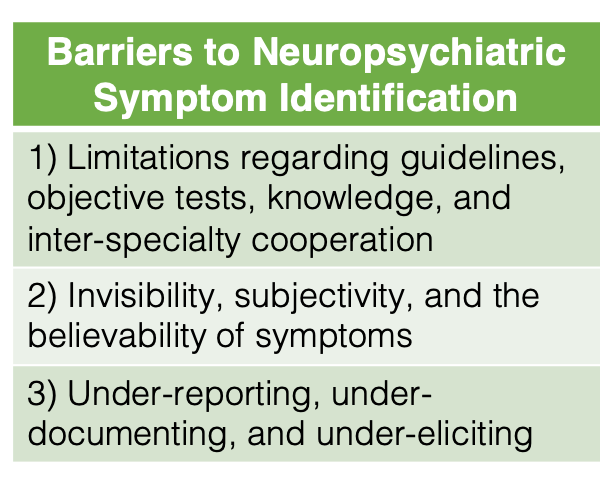News
Article
Neuropsychiatric Symptoms in Rheumatic Disease Greatly Underestimated by Clinicians
Author(s):
All 30 neuropsychiatric symptoms included were significantly higher in patients with systemic autoimmune rheumatic diseases when compared with controls.
Self-reported prevalence of neuropsychiatric symptoms were significantly higher in patients with systemic autoimmune rheumatic diseases (SARDs) when compared with controls, and are vastly underestimated by most clinicians, according to a study published in Rheumatology.1 Investigators believe improved inter-specialty communication and better patient involvement is needed in both care and research, as research relying on guidelines and medical records may inaccurately reflect the patient’s experience of their symptoms.

Neuropsychiatric symptoms in this patient population are linked to increased mortality and morbidity, as well as reduced quality of life. They commonly include headache, depression, anxiety, confusion, tremors, seizure, stroke, vision problems, and confusion.2 Although previous research has assessed the prevalence of usual symptoms in patients with SARDs, data exploring other potential neuropsychiatric symptoms, such as psychiatric, auditory-vestibular, and neuroophthalmological, are limited.3
“Identifying neuropsychiatric symptoms as SARD symptoms can assist in diagnosis and disease management,” wrote Melanie Sloan, PhD, Department of Public Health and Primary Care Unit, University of Cambridge, Cambridge, UK, and colleagues. “However, the diverse range of potential symptoms, limited biomarkers to assist in assessing causation, and a lack of understanding as to etiology, can inhibit identification. Attribution is complicated by SARD patient quality of life usually being substantially adversely altered, and therefore some neuropsychiatric symptoms such as depression may have varying levels of a reactive component or be multifactorial in origin.”
The INSPIRE (Investigating Neuropsychiatric Symptom Prevalence and Impact in Rheumatology patient Experiences) project used a mixed methods approach to investigate a wider range of symptoms (n = 30), often excluded from previous literature, compare self-reported patient data with clinician estimates, and explore potential barriers to identifying these symptoms. A pre-tested survey was distributed to patients between July 2022 and September 2022 and to clinicians in November 2022.
Data from 1853 adult patients with SARDs were compared with 463 controls and 289 clinicians. Investigators analyzed 113 in-depth interviews (67 patients and 46 clinicians) and used the findings to create themes. Statistical tests were conducted to compare patients and controls, clinician specialties, and 8 different SARDs, including inflammatory arthritis, systemic lupus erythematosus, Sjögrens, vasculitis, and polymyalgia rheumatica.
All 30 neuropsychiatric symptoms included were significantly higher in the SARD cohort when compared with controls, even after adjusting for age, gender, ethnicity, and country of residence. More than half (57%) of patients with SARDs reported having depression and anxiety. Other symptoms with the highest prevalence included fatigue (89%), insomnia (76%), and cognitive dysfunction (70%).
Barriers to symptom identification included: 1) limitations regarding guidelines, objective tests, knowledge, and inter-specialty cooperation; 2) invisibility, subjectivity, and the believability of symptoms; and 3) under-reporting, under-documenting, and under-eliciting.
Approximately two thirds of patients (74%) reported never or rarely being asked about mental health symptoms during clinic visits, although 4% of clinicians reported never or rarely asking patients about their mental health (P <.001). Over 50% of patients with SARDs had never or rarely reported their mental health symptoms to a clinician, although clinicians estimated that percentage to be <10% (P <.001).
Investigators noted strengths of the study, such as incorporating a broad range of symptoms and SARDs. The multi-disciplinary team also allowed for the prioritization of patients’ perspectives. However, generalizability may have been limited by recall bias, self-reported diagnoses, and survey recruitment via social media. Additionally, online surveys may exclude patients who are the most unwell and disadvantaged.
“The next stages of the INSPIRE project will investigate: attribution of neuropsychiatric symptoms, eliciting and reporting of neuropsychiatric symptoms, the impact of these symptoms on patient lives, and specific challenges and inequalities experienced by SARD patients from ethnic minorities,” investigators concluded.
References
- Sloan M, Wincup C, Harwood R, et al. Prevalence and identification of neuropsychiatric symptoms in systemic autoimmune rheumatic diseases: an international mixed methods study [published online ahead of print, 2023 Jul 26]. Rheumatology (Oxford). 2023;kead369. doi:10.1093/rheumatology/kead369
- Neuropsychiatric Systemic Lupus Erythematosus (NPSLE) in Children. Cincinnati Childrens. (n.d.). https://www.cincinnatichildrens.org/health/n/neuropsychiatric-systemic-lupus-erythematosus
- Manzo C, Nizama-Via A, Milchert M, et al. Depression and depressive symptoms in patients with polymyalgia rheumatica: discussion points, grey areas and unmet needs emerging from a systematic review of published literature. Reumatologia 2020; 58: 381-389. 20201223. DOI: 10.5114/reum.2020.102003.





